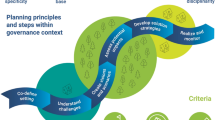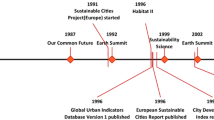Abstract
Environmental planning at different levels has been called for by environmental departments in China during last years to integrate environment consideration to economic development. Based on the accomplished environmental planning practice in Xiamen China, the paper suggests a general environmental planning process with ecological function zoning as its key steps, at the same time an effective method for ecological function zoning was formulated. The case studies of Dongfu suburban town environmental planning and Xiamen eco-city conceptual planning indicate that scientifically sound results of ecological function zoning can contribute to improving not only the adaptability and acceptability of environmental planning, also the environmental management and the decision-making. The experience shows that the ecological function zoning methods should be applied according to the principles of adaptive management, resource-based and community-based, so that it can integrate science into decision-making process, avoiding both narrow-minded viewpoints of planners and natural resource use conflicts among variety of stakeholders. Problems to be resolved in the future are also pointed out in the ending part.
Similar content being viewed by others
References
Alcala, A. C. (1998). Community-based coastal resource management in the Philippines: a case study. Ocean & Coastal Management, 38, 179–186
Baldwin, J. H. (1985). Environmental planning and management. Westview Press
Dalkey, N., & Helmer, O. (1963). An experimental application of the Delphi method to the use of experts. Management Science, 9(3), 458–467
Daniel, S. E., Diakoulaki, D. C., & Pappis C. P. (1997). Operations research and environmental planning. European Journal of Operational Research, 102, 248–263
Dougherty, T. C., & Hall, A. W. (1995). Environmental impact assessment of irrigation and drainage projects. HR Wallingford United Kingdom, 53 FAO IRRIGATION AND DRAINAGE PAPER
FAO, (1993). Guidelines for land-use planning. FAO Development Series, No.1. Rome, FAO, 96 pp
Holling, C. S. (1978). Adaptive environmental assessment and management. John Wiley & Sons
Luttinger, N. (1997). Community-based coral reef conservation in the Bay Islands of Honduras. Ocean & Coastal Management, 36, 11–22
MA Board (2005). Millennium Ecosystem Assessment Synthesis Report. http://www.MAweb.org (accessed April 2, 2005)
Mulcrone, A. (1993). Planning for coastal areas and inland waterways. Proceedings of the Irish Planning Institute Annual Conference, Cork
Okoli, C., & Pawlowski, S. D. (2004). The Delphi method as a research tool: an example, design considerations and applications. Information & Management, 42(1), 15–29
Ortolano, L. (1984). Environmental planning and decision making. Willy Press
Richardson, T., & Dusik, J. (1998). Parallel public participation: an answer to inertia in decision- making. Environ Impact Assessment Review, 18, 201–216
Tickner, J., Raffensperger, C., & Myers, N. (1998). The precautionary principle in action—a handbook. Windsor North Dakota, Science and Environmental Health Network
Walters, C. (1986). Adaptive management of renewable resources. Macmillan
Acknowledgement
Gratefulness to Xiamen Environmental Protection Bureau for the economic support granted to the research project. We would like to thank Prof. Dr. Stoyan Stoyanov from University of Chemical Technology and Metallurgy, Sofia, Bulgaria and the other anonymous reviewer for their valuable comments.
Author information
Authors and Affiliations
Corresponding author
Rights and permissions
About this article
Cite this article
Fang, Q., Zhang, L., Hong, H. et al. Ecological Function Zoning for Environmental Planning at Different Levels. Environ Dev Sustain 10, 41–49 (2008). https://doi.org/10.1007/s10668-006-9037-4
Received:
Accepted:
Published:
Issue Date:
DOI: https://doi.org/10.1007/s10668-006-9037-4




